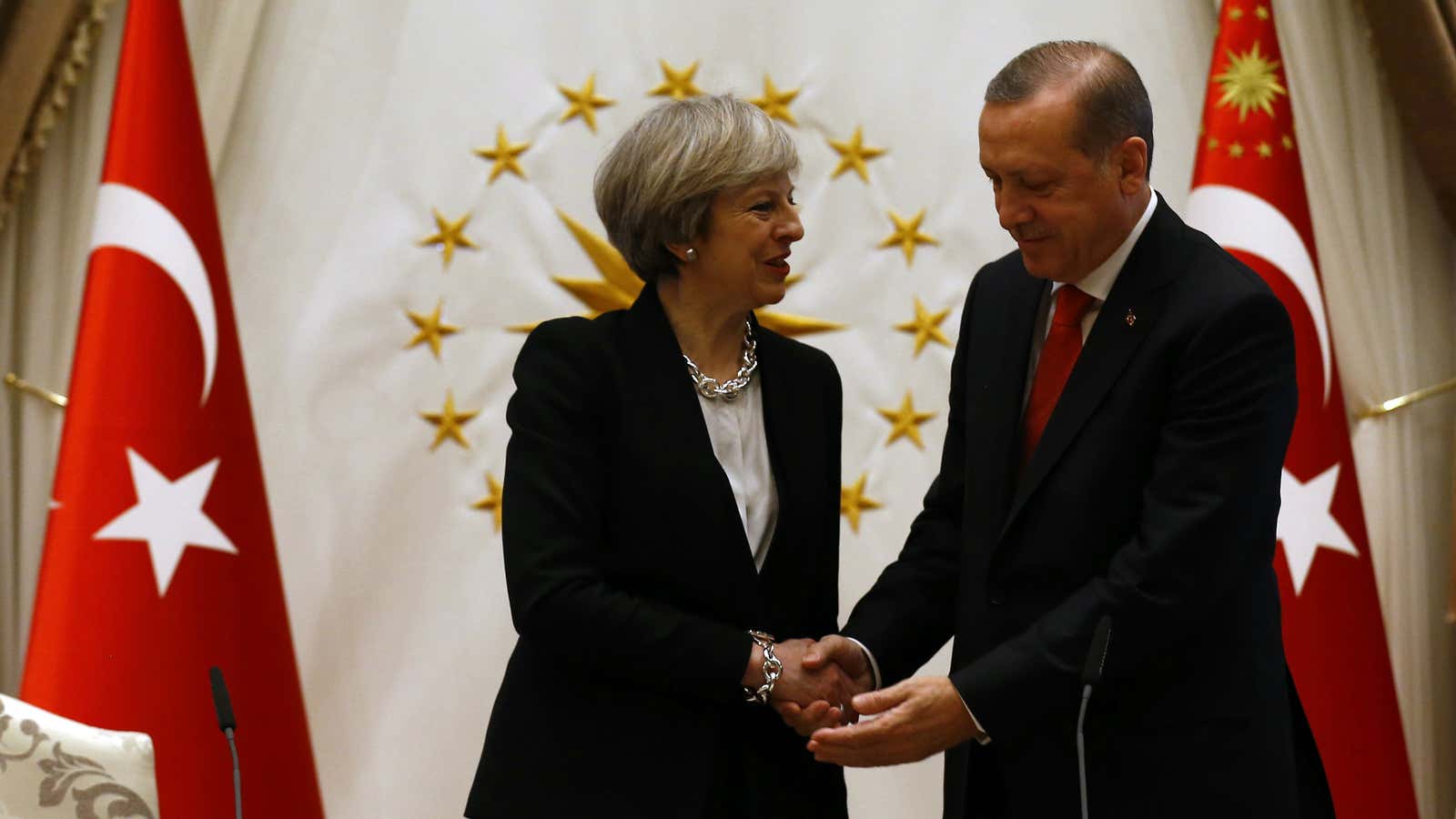“A Global Britain.” That is how UK prime minister Theresa May describes her country once it’s divorced from the European Union, trading freely and independently with countries all over the world (including its old friends in Europe). It’s a “bold, ambitious course,” she adds. It’s also a big gamble, according to a report by the National Institute of Economic and Social Research (Niesr).
When the UK quits the EU it will also leave the bloc’s single market and the customs union. Even if post-Brexit Britain were to sign a free-trade agreement (FTA) with the EU, by far its largest trading partner, trade with members in the bloc would still fall by 45% compared with when the UK was a member. Monique Ebell, a research fellow at Niesr, says that’s because the EU market is more open than a traditional free-trade zone, thanks to lower non-tariff barriers, which is especially important for services. The UK economy is almost 80% services.
Needless to say, UK trade with the EU would decline even more steeply, by 59%, if it signed no special deal with the bloc and reverted to the standard tariffs and rules set by the World Trade Organization. This drop would take place over a long period of time, perhaps 10 years or more, according to Ebell.
May is already laying the groundwork for trade deals with countries outside the EU, starting with the US, Turkey, and New Zealand. But the likely trade with these countries won’t be enough to offset the loss of trade with the EU’s single market. Niesr research shows that trade deals with the BRIICS (Brazil, Russia, India, Indonesia, China, and South Africa) could increase UK trade with those countries by 19%. FTAs with Anglo-American countries (US, Canada, New Zealand, and Australia) would increase trade by just 12%.
Together, the increase the UK would get from trade with all the BRIICS or Anglo-American countries only covers about a tenth of what will be lost from leaving the EU’s single market, Ebell says.
Niesr’s estimates are based on common features of existing international trade deals. “If the UK wishes to replace the trade at risk from leaving the single market, its new trade deals will need to be much more effective at generating trade than most of those currently in existence, particularly for services,” the report notes. So, the UK’s new deals would need to be as sweeping as the agreement that applies between member states in the EU, which has been expanding and evolving since WWII.
Beyond eliminating tariffs, harmonizing regulations, laws, and other standards will also be needed. Partners may want to include relaxed immigration rules as part of trade deals, which will sit awkwardly with the pro-Brexit camp’s stance on “taking back control” of the UK’s borders. Put simply, the new agreements would need to be more comprehensive and nuanced than almost any deals that exist today.
Is the UK equipped to negotiate these ultra-sophisticated deals? Personnel is already a problem. The government’s Department for International Trade is only six months old and doesn’t have many expert trade negotiators, since for decades that function has been handled by the EU on behalf of member states.
There’s also the matter of which partners the UK chooses to deal with. Plans to get to the “front of a queue” for a deal with the US have been complicated by president Donald Trump’s “America First” policy and ban on immigration from seven majority Muslim countries. Fresh from a high-profile visit to Washington, May was slow to denounce the ban in the face of political pressure back home, as petitions and protests against her invitation for a state visit by Trump grew. May then went to Turkey and signed a $125 million defense trade deal (paywall), despite Turkish president Recep Tayyip Erdogan’s increasingly erratic and authoritarian rule.
It is already a huge challenge to replace the lost trade from leaving the EU, much less sign the sorts of deals that will make the UK better off after Brexit. What’s more, in the scramble to secure these deals, May must balance the UK’s commercial interests and its reputation (paywall).
